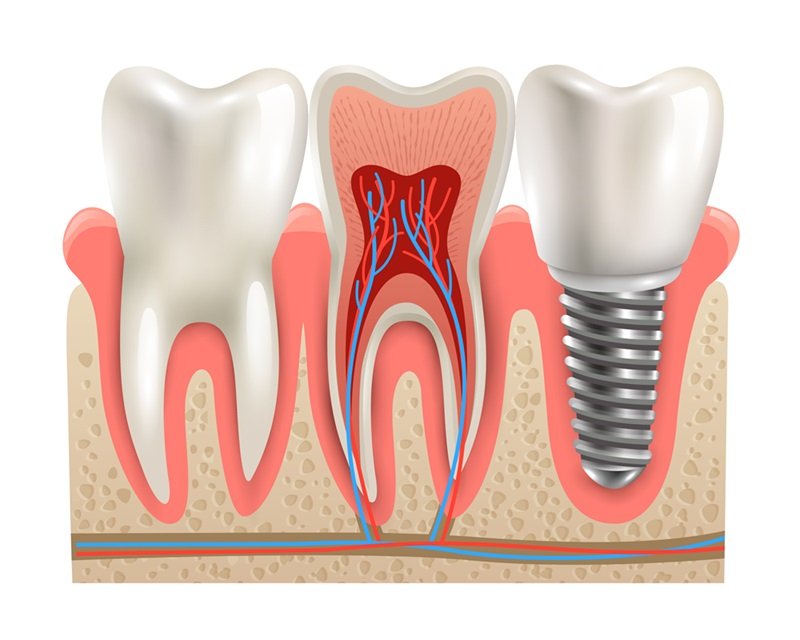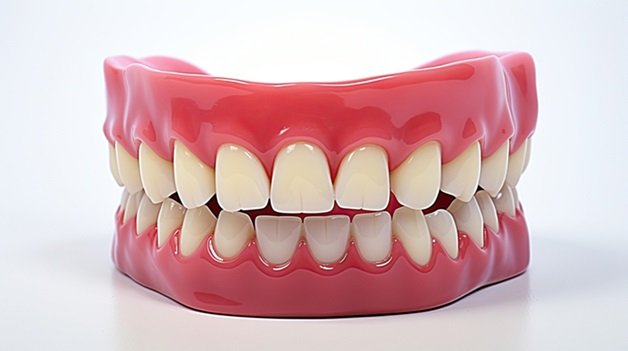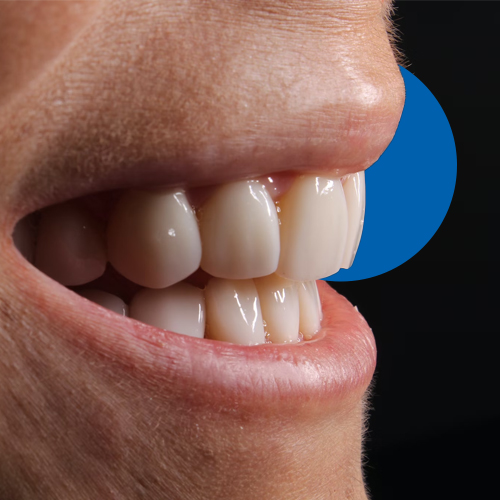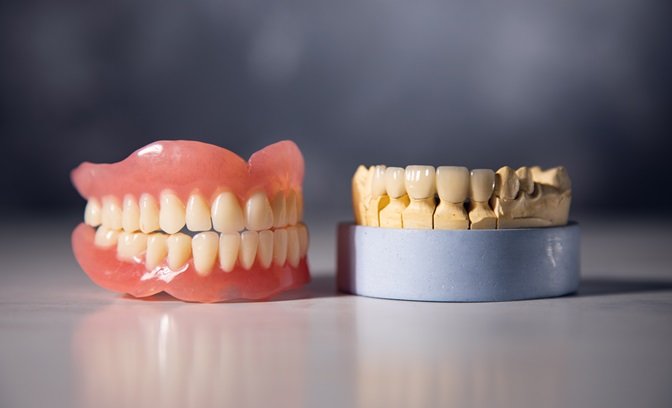Introduction:
Missing teeth pose a significant challenge, impacting aesthetics, chewing ability, and even speech. Fortunately, modern dentistry offers multiple solutions, including dental implants and dentures. While both options aim to replace missing teeth, they differ significantly in function, feel, and maintenance. This blog explores the key differences between dental implants and dentures, empowering you to make an informed decision about your smile restoration journey.

Dental Implants: A Permanent Solution
Dental implants, are small, biocompatible titanium posts surgically placed into the jawbone. These implants act as anchors for artificial teeth, mimicking the natural tooth root structure. Over time, the implants fuse with the jawbone through a process called osseointegration, providing a strong and stable foundation for replacement teeth.
Benefits of Dental Implants:
- Enhanced Stability and Comfort: Unlike dentures that can slip or shift, dental implants offer unparalleled stability and comfort. You can eat, speak, and smile with confidence, without the worry of your teeth moving.
- Improved Chewing Ability: Dental implants allow you to chew effectively, similar to natural teeth. This promotes better digestion and nutrient absorption.
- Preserves Jawbone Health: Dental implants stimulate the jawbone, preventing the bone loss that can occur after tooth extraction. This maintains facial structure and prevents a sunken appearance.
- Long-Term Durability: Dental implants are highly durable and can last a lifetime with proper care.

Dentures: A Traditional Approach
Dentures are removable prosthetic devices used to replace missing teeth. They can be full dentures for a complete arch of missing teeth or partial dentures for a few missing teeth. Dentures typically consist of a plastic base that fits over the gums and acrylic teeth.
Benefits of Dentures:
- Cost-Effective Option: Dentures are generally less expensive than dental implants upfront.
- Non-Surgical Procedure: No surgery is involved in getting dentures, making them a suitable option for individuals with certain health concerns.
- Relatively Quick Solution: Dentures can be fabricated and placed in a shorter timeframe compared to dental implants.
Drawbacks of Dentures:
- Potential for Slipping and Discomfort: Dentures can slip or shift while eating or speaking, causing discomfort and embarrassment. Denture adhesives can help improve stability.
- Compromised Chewing Ability: Chewing with dentures can be less effective compared to natural teeth or dental implants.
- Bone Loss Over Time: Without the stimulation of tooth roots, jawbone deterioration can occur over time with dentures, leading to a sunken appearance.
- Regular Adjustments and Replacements: Dentures may need adjustments or replacements over time due to wear and tear or changes in the jawbone.
Dental Implants Vs Dentures: Choosing Between Dental Implants and Dentures
The best choice between dental implants and dentures depends on your individual needs, preferences, and budget. Here are some key factors to consider:
-
- Severity of Tooth Loss: Dental implants are typically preferred for multiple missing teeth or full-arch replacements for optimal stability and function. Partial dentures can be a suitable option for a few missing teeth.
- Jawbone Health: Sufficient jawbone density is crucial for successful implant placement. Bone grafting procedures may be required if bone loss has occurred.
- Overall Health: Generally, good overall health is necessary for implant surgery.
- Financial Considerations: Dental implants have a higher initial cost, but they offer a long-term solution compared to dentures that may require replacements.
- Desired Level of Comfort and Functionality: Implants offer superior comfort, stability, and chewing ability compared to dentures.

Informative FAQs:
Am I a good candidate for dental implants?
Consulting with a qualified dentist or periodontist is essential to determine your candidacy for dental implants. They will assess your jawbone health, overall health, and the number of teeth missing.
What is the procedure for getting dental implants?
Dental implant placement typically involves multiple stages, including consultation, surgery for implant placement, healing time, and attachment of the artificial teeth.
How much do dental implants cost?
The cost of dental implants can vary depending on the number of implants needed, the complexity of the procedure, and your geographic location. Generally, dental implants have a higher initial cost than dentures, but they offer a long-term solution.
How long do dental implants last?
With proper care, dental implants can last a lifetime. They are a durable and stable solution for replacing missing teeth.
How do I care for dental implants?
Caring for dental implants involves practicing good oral hygiene habits, including brushing and flossing regularly. Regular dental checkups are also crucial to maintain the health of the implants and surrounding tissues.
Are there any risks associated with dental implants?
As with any surgery, there are potential risks associated with dental implant placement, such as infection or bleeding. However, these risks are minimized by choosing a qualified and experienced dentist or periodontist.
Schedule Your Consultation Today!
Both dental implants and dentures can restore your smile and improve your quality of life. However, dental implants provide a more permanent, natural-feeling, and functional solution. Consulting with a qualified dentist or periodontists at ADP can help you determine the best option based on your specific needs and goals.
American Dental Practices, with locations in Oberoi Mall, Malad, Mumbai and Indiranagar, Bangalore, house a team of experienced dentists and periodontists who can guide you through the decision-making process and answer any questions you may have about dental implants and dentures.)
Remember, a healthy smile is an investment in your overall well-being.
Dentures or Dental Implants, Get Consulted and FIND OUT!
Best Results Guaranteed! Book now.






